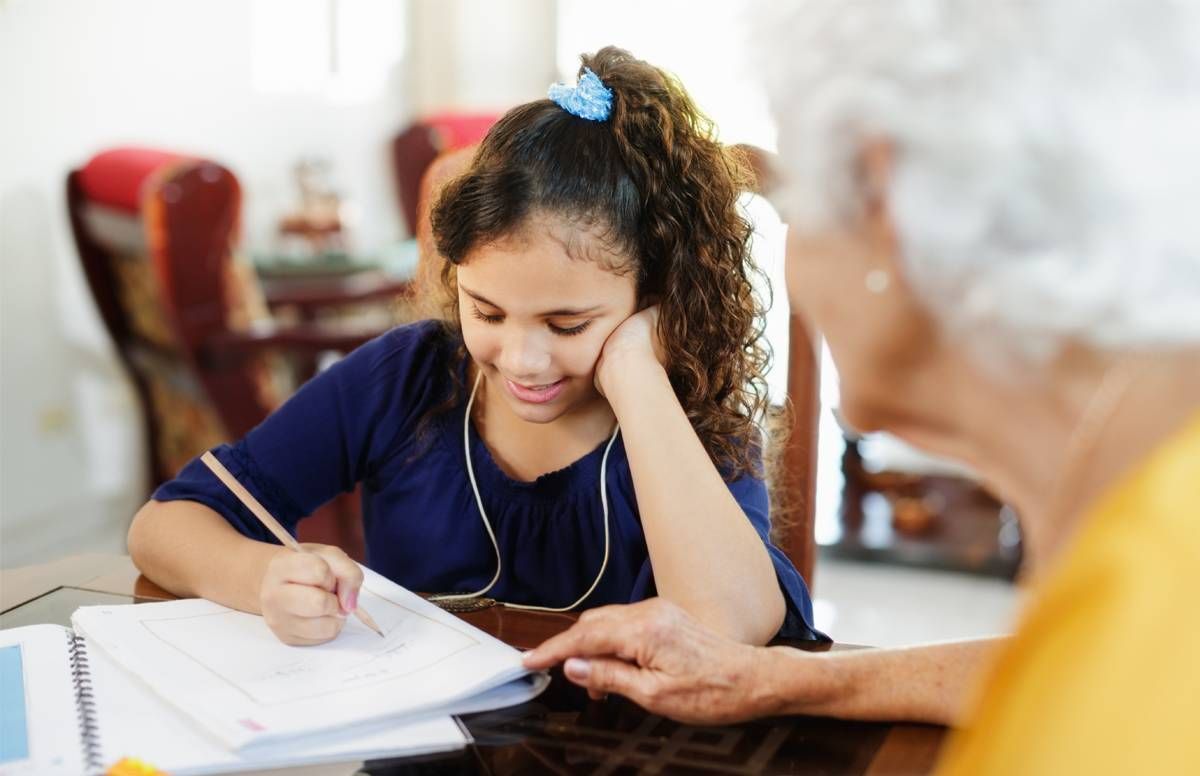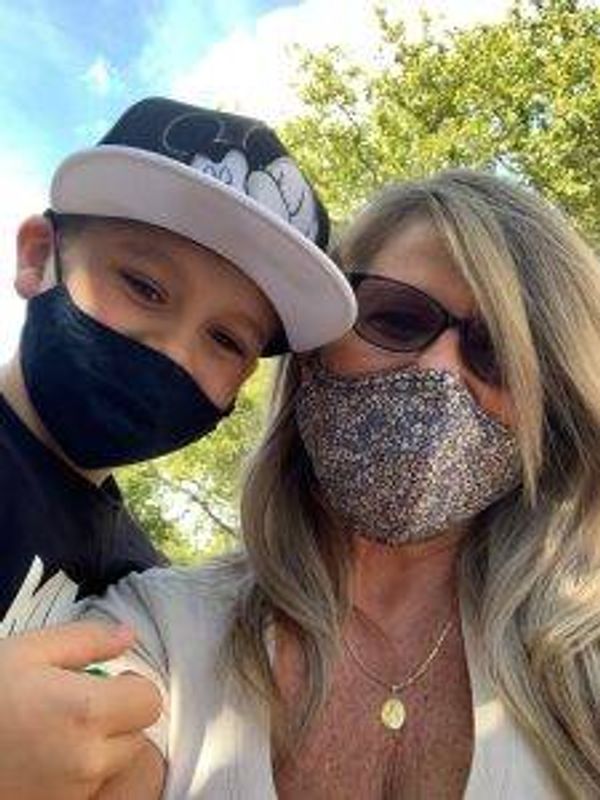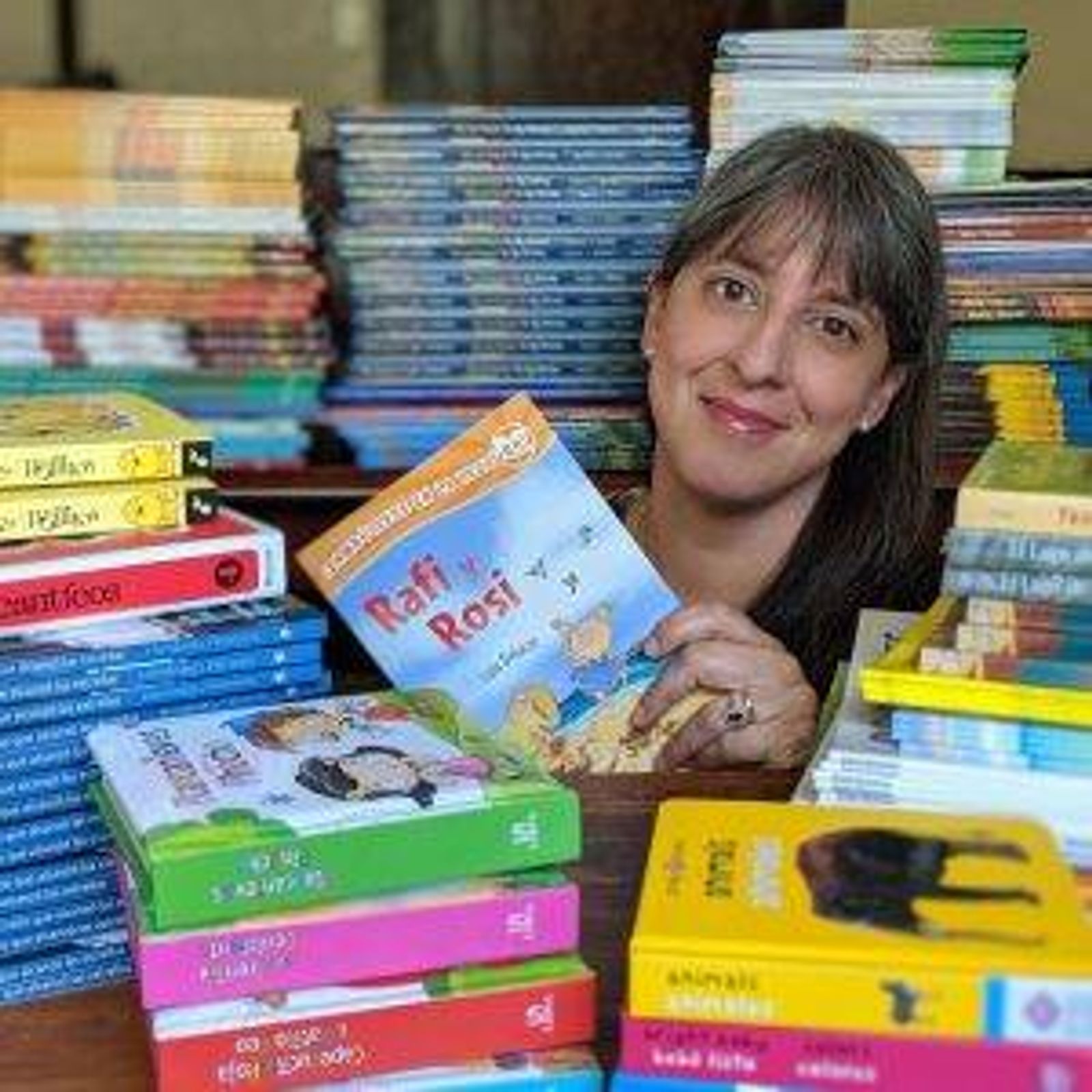This School Year, Grandparents Step In to Help Grandkids Learn
From distance learning to homeschooling, they've gone 'back to class' in the pandemic
Rosemary Cass admits she's not a morning person, but in just a few short weeks, she has become one.

This Fairfield, Conn. grandmother, 71, has to be ready by 9 a.m. to sit down with first-grade grandson, Kwin (her daughter's son), as the two of them log in for the first part of his hybrid school day.
They work together as Kwin watches pre-recorded videos his classroom teacher has posted focusing on numbers, letters and other first-grade curriculum staples.
Then at 1 p.m., Cass walks with Kwin to the school bus stop. He joins five other kids for a trip to school where they finish out the day with "specials" such as gym, music and art.
Cass, who worked for 23 years in the pharmaceutical industry, launched a print magazine (now shuttered) after retiring and currently writes a blog on aging, has been proficient on a computer for years.
"For any grandparent doing this, my advice is to ask questions."
However, she found the learning curve for Kwin's online work to be "incredibly complicated and difficult," she says.
"At first, I was pulling my hair out, clicking this and that, and blaming myself for not understanding how everything worked," Cass explains.
Her other daughter, a college professor, assured Cass that "a lot of teachers are learning how [online school] all works, too."
Cass now reaches out to Kwin's teacher with questions; maintaining open lines of communication has made a big difference.
"For any grandparent doing this, my advice is to ask questions," she says.
Our Commitment to Covering the Coronavirus
We are committed to reliable reporting on the risks of the coronavirus and steps you can take to benefit you, your loved ones and others in your community. Read Next Avenue's Coronavirus Coverage.
The 'New Normal' of School
Like Cass, many grandparents across the country are stepping in to help their young grandchildren navigate the "new normal" of the school day, whether that's distance learning, hybrid learning (partially at home, partially at school) or homeschooling.
Next Avenue recently posted a question on Facebook asking readers if they have been tapped to help their grandchildren with school in order to assist parents who, even when working remotely, need that boost. We received several responses, where readers reported both the joys and challenges of the experience.
Amy Dickieson Bakken, who lives in Wisconsin, wrote: "My husband and I are helping our grandsons (kindergarten and second grade) with their virtual learning. I thought I was pretty good with computers but I have to say that having to log on to different programs to get to kindergarten activities have made many challenges for me. I never knew being a kindergartner could be so tough."
One reader said she and her husband, both retired professors, are working on preschool skills with their grandchild. Another grandmother is helping her twin 12-year old granddaughters in her apartment as they engage in distance learning.
And a grandmother of a seventh-grade grandson, who has a diagnosis of high functioning autism, is coaching him through virtual learning. "Lots of highs and lows," she wrote. "By the end of the week, I am more ready for the weekend than when I was working."
The Difference Between Grandma and Teacher
Phoebe Kohman of Chanhassen, Minn., is juggling the distance learning routines of two granddaughters, ages 7 and 8, who are in second and third grade, as well as their 3-year-old sister, a preschooler.
And even the retired elementary school teacher of 33 years is finding this new type of classroom challenging.
"We're working five days a week, from 9 a.m. to 2 p.m., on four subjects per day, and it's fairly intense," she says.
Kohman's daughter, Liz, who is working remotely as a writer and editor, helps not only with the preschooler, but with the older girls as needed. On Tuesdays and Thursdays, Liz teaches them art, and every weekend, she, her husband and the girls, have created their own "Science Saturday" routines.
The school district is providing the online curriculum, as well as mailing out additional items to families, such as picture books and even musical instruments; Kohman's oldest granddaughter is playing the recorder.
"You talk to your grandma differently than you would talk to your teacher."
Their days are very scheduled, including a planned lunch break and time for recess. They've established a dedicated classroom in the house (Kohman and her husband live about 30 minutes away from her daughter and son-in-law) and during the day, it's become important for Kohman to establish her role not as "Grandma" but as teacher.
"The first day, I wore my lanyard from my former school," says Kohman. "You talk to your grandma differently than you would talk to your teacher. We've had a few times when I've had to remind them of that, but overall, they are responding pretty well."
Kohman soon found that her teaching experience has paid off, and in some ways, she has picked up right where she left off.
"I'm lesson-planning for two grade levels. Every evening, I'm putting in almost the same amount of prep time as I used to do," she says. "I love it because I love teaching. I know how to make changes so that lessons will be more interesting."
However, she knows that's not the case for many who are helping their grandchildren learn.
"I can't imagine how a grandparent without an educational background can get through this [experience]," Kohman says.
'The Daily Dance'
Myanna Carbin-O'Brien, 52, is raising her nine-year-old granddaughter, in addition to her sons, ages 11 and 13, in Holyoke, Mass., along with her partner Chris, 55, an intake nurse currently working remotely.
In the quiet half hour before the official start of their family's school day at 8:45 a.m. (the boys are being homeschooled, and her granddaughter is doing distance learning through the local elementary school she attended prior to the pandemic), Carbin-O'Brien talked about the "daily dance" all of them are doing to make sure the kids are getting the help they need with their school work.
From 9 a.m. to noon, Carbin-O'Brien works with her sons downstairs, while her granddaughter is upstairs on her computer in virtual school, with Chris nearby on her work computer in case the third grader, who is in a dual-language program of Spanish and English, needs help.
"We have two other kids who are part of our homeschooling pod — and our quarantine bubble — so they come over and the four of them work together," Carbin-O'Brien says, adding that the afternoon for the older students is largely spent on homework.
Carbin-O'Brien compares juggling different grades and different learning formats to "taking a dance class at a school where the class has never been offered before."
When you're working with multiple children at various ages and stages, according to Carbin-O'Brien, the reality is that "you are their paraprofessional. Your job is to help manage their schooling." And for parents trying to manage their own work lives, Carbin-O'Brien says she's not surprised they are looking to grandparents for help.
Helping Other Kids, Too
Donna Byrnes is helping her only grandson Bryan, 7, with daily life as a second grader at her home in Brooklyn, N.Y. In addition to the online learning he's doing ("I'm very rarely on the computer, but I'm getting much more used to it," Byrnes says), Bryan has also spearheaded his own extracurricular project: "Bryan's Book Corner."

"He loves to read and he always has," his grandmother says. "At the beginning of the pandemic, he started doing Zoom videos where he would read a book so that other kids, who were missing story time at libraries and at school, could watch."
These videos caught the attention of several news and entertainment outlets including CBS News and "Live with Kelly and Ryan," where he was interviewed by Kelly Ripa and Ryan Seacrest and read "Harold and Hog Pretend for Real!"
Byrnes says her biggest challenge working with Bryan is his high energy level. "But I'm enjoying it — I love hanging out with him," she says. "I'm going to be sixty, and I'm sure I'll probably learn a thing or two."
6 Tips for Creating a Positive Learning Environment
Monica Olivera, a homeschooling mother of three and the founder of Mommy Maestra, a homeschool resource for Latino families, says from what she's been seeing online from parents, there are many children, especially young ones, who are struggling mightily with distance learning.
Olivera, who lives in Freeman, Texas, has a 16-year old junior in high school, a 14-year old ninth grader and a 3-year old.
She says there's a definite distinction between homeschooling and distance learning.
"When you homeschool a child, you are focused on teaching the curriculum yourself. With distance learning, kids are sitting and watching school on a computer screen," she explains.
"With this style of learning, their brains are working hard to figure everything out."
For grandparents finding themselves in the new role as teachers, Olivera offers these tips to help create a positive physical and mental learning environment for kids:
1.Create a dedicated space. "Try to find an area that's away from noise, and from very young children in the home if possible," she says. A corner is often a good choice, and if the child has their back to the corner wall, this can give them some privacy when it comes to sharing their homes with classmates.
Other things to consider: noise cancelling headphones, as well as a free Zoom background for their computer, which also helps with privacy, and makes their work atmosphere a little more fun.
2. Add a comfortable chair. "A lot of schools don't allow students to be on their beds during class; I know that's the case with many high schools," Olivera says. Another option is a balance ball. When their bodies can move, it can help with focus.

3. Offer water and snacks regularly. And mini exercise breaks. "With this style of learning, their brains are working extra hard to figure everything out," Olivera says. Breaks are very important; encourage the kids to get up and dance around for a couple of minutes. Better yet, join them!
"If they see their grandparents moving, they'll probably want to join you," she says. "It's a good excuse for grandparents to move, too."
4. Keep them safe online and use a watchful eye. "Kids are spending more time than ever online. If they are positioned in a way that you can't see their screens, consider hanging a mirror high behind them (if they are in a corner) so you can glance occasionally," says Olivera.
Since most grandparents wouldn't normally have parental controls on their computers, consider using them if your grandchild will be using your computer.
5. Communicate with your grandchildren and offer positive encouragement. "Ask them how you can help them — and ask every few days. They might be forthcoming sometimes, but other times not. Encourage them and tell them you understand that this is very different for everyone," Olivera says.
6. Give them the opportunity to connect with friends online two or three times a week at the end of the school day. "Maybe they can play games over Zoom, or just chat for twenty minutes with a friend. If they want to play video games, just make sure to set time limits. Their brains and their eyes need rest from screens," says Olivera.
An Unexpected Opportunity
Amanda Warren's mother and daughter have taken distance learning to a different level.
Warren's mom, 72, who lives in Chaska, Minn., is a distance learning teacher to her granddaughter, Olivia, who's in third grade in a Boston school.
"Last spring, when Olivia's classroom moved to Zoom as the pandemic hit, it didn't go well for her. We were nervous about going into third grade in the same way, so we registered as a homeschooling family," says Warren.
Warren's mom, who had been working in a small law office, was laid off due to COVID-19, but didn't feel ready to retire. So, she and Olivia started doing math "together" three times a week — right now, the challenge is multiplication tables.
"It helped me so I would have one less thing on my plate," says Warren, a medical speech language pathologist who is teaching college students via Zoom. "My mom works with Olivia while I'm working with my students."
Warren says this unexpected opportunity has yielded "heartwarming" results for her family.
"We live across the country, so this has given Olivia and her Nana more time to spend together," says Warren. "For my mom, it's given her purpose and a distraction from this scary time."


